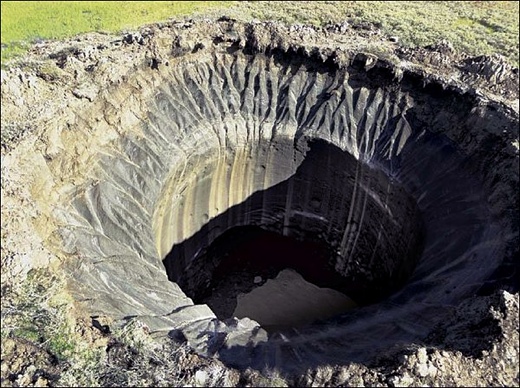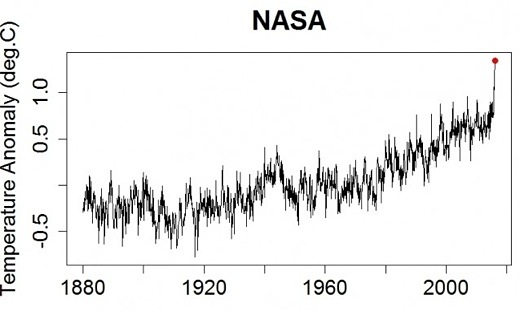SUBHEAD: James Schlesinger once said "people have only two modes of operation - complacency and panic."
By Ugo Bardi on 15 March 2016 for Cassandra's Legacy -
(http://cassandralegacy.blogspot.co.uk/2016/03/the-climate-emergency-time-to-switch-to.html)

Image above: Photograph of one of many giant methane craters found in Siberia - a bad sign for Earth's current climate. From (http://www.scoopnest.com/user/p_hannam/586075754556829696).
James Schlesinger once uttered one of those profound truths that explain a lot of what we see around us: it was: "people have only two modes of operation: complacency and panic."
So far, we have been in the "complacency" mode of operation in regard to climate change: it doesn't exist, if exist it is not a problem, if it is a problem, it is not our fault, and anyway doing something about it would be too expensive to be worth doing. But the latest temperature data are nothing but spine-chilling.
What are we seeing? Is this just a sort of a rebound from the so-called "pause"? Or something much more worrisome? We may be seeing something that portends a major switch in the climate system; an unexpected acceleration of the rate of change.
There are reasons to be worried, very worried: the CO2 emissions seem to have peaked, but that didn't generate a slowdown of the rate of increase of the CO2 concentration in the atmosphere. If nothing else, it is growing faster than ever. And then there is the ongoing methane spike and, as you know, methane is a much more potent greenhouse gas than CO2.
What's happening? Nobody can say for sure, but these are not good symptoms; not at all. And that may be a good reason to switch to panic mode.
The problem is that societies; specifically in the form called "states" do not normally show much intelligence in their behavior, especially when they are in a state of panic. One of the reasons is that states are normally ruled by psychopaths whose attitude is based on a set of simple rules, mainly involving intimidation or violence, or both.
But it is not just a question of psychopaths in power; the whole society reacts to threats like a psychopath: with the emphasis on doing "something", without much concern about whether it is the right thing to do and what would the consequences could be. So, if climate starts to be perceived as a real and immediate threat, we may expect a reaction endowed with all the strategic finesse of a street brawl: "you hit me - I hit you."
A possible, counterintuitive, panic reaction might be of "doubling down" in the denial of the threat. That could lead to actions such as actively suppressing the diffusion of data and studies about climate; de-funding climate research, closing down climate research centers, marginalizing those who believe that climate is a problem; for instance classifying them among "terrorists."
All that is already happening in some degree and it may well become the next craze, in particular if the coming US elections will handle the presidency to an active climate denier. That would mean hard times for at least a few years for everyone who is trying to do something against climate change. And, perhaps, it would mean the total ruin of the Earth's ecosystem.
The other possibility is to switch all the way to the other extreme and fight climate change with the same methods used to fight terrorism; that is, bombing it into submission.
Of course, you cannot bomb the earth's climate into submission, but the idea of forcing the ecosystem to behave the way we want is the basic concept of "geoengineering".
In the world of environmentalism, geoengineering enjoys more or less the same reputation that Saddam Hussein enjoyed in the Western press in the 1990s. That's for good reasons: geoengineering is often a set of ideas that go from the dangerous to the impossible, all ringing of desperation.
For a good idea of how exactly desperate these ideas can be, just take a look at the results of a recent study on the idea of pumping huge amounts of seawater on top of the Antarctic ice sheet in order to prevent sea level rise. If it were a science fiction novel, you'd say it is too silly to be worth reading.
However, it may be appropriate to start familiarizing with the idea that geoengineering might be the next world craze. And, perhaps, it is better to take the risk of doing something that could go wrong than to do nothing, considering that we have been doing nothing so far.
Don't forget that there are also good forms of geoengineering, for instance the form called "biosphere regeneration." It is based on reforestation, fighting desertification, regenerative agriculture and the like.
Removing some CO2 from the atmosphere by transforming it into plants can't do too much damage, although it cannot be enough to solve the problem. But it may stimulate also other fields of action against climate change; from adaptation to switching to reneable energy. Maybe there is still hope..... maybe.

Image above: NASA Chart of temperature since 1880 show recent spike. Reports of a giant methane craters found in Siberia - bad sign for Earth's current climate. From original article.
.
By Ugo Bardi on 15 March 2016 for Cassandra's Legacy -
(http://cassandralegacy.blogspot.co.uk/2016/03/the-climate-emergency-time-to-switch-to.html)

Image above: Photograph of one of many giant methane craters found in Siberia - a bad sign for Earth's current climate. From (http://www.scoopnest.com/user/p_hannam/586075754556829696).
James Schlesinger once uttered one of those profound truths that explain a lot of what we see around us: it was: "people have only two modes of operation: complacency and panic."
So far, we have been in the "complacency" mode of operation in regard to climate change: it doesn't exist, if exist it is not a problem, if it is a problem, it is not our fault, and anyway doing something about it would be too expensive to be worth doing. But the latest temperature data are nothing but spine-chilling.
What are we seeing? Is this just a sort of a rebound from the so-called "pause"? Or something much more worrisome? We may be seeing something that portends a major switch in the climate system; an unexpected acceleration of the rate of change.
There are reasons to be worried, very worried: the CO2 emissions seem to have peaked, but that didn't generate a slowdown of the rate of increase of the CO2 concentration in the atmosphere. If nothing else, it is growing faster than ever. And then there is the ongoing methane spike and, as you know, methane is a much more potent greenhouse gas than CO2.
What's happening? Nobody can say for sure, but these are not good symptoms; not at all. And that may be a good reason to switch to panic mode.
The problem is that societies; specifically in the form called "states" do not normally show much intelligence in their behavior, especially when they are in a state of panic. One of the reasons is that states are normally ruled by psychopaths whose attitude is based on a set of simple rules, mainly involving intimidation or violence, or both.
But it is not just a question of psychopaths in power; the whole society reacts to threats like a psychopath: with the emphasis on doing "something", without much concern about whether it is the right thing to do and what would the consequences could be. So, if climate starts to be perceived as a real and immediate threat, we may expect a reaction endowed with all the strategic finesse of a street brawl: "you hit me - I hit you."
A possible, counterintuitive, panic reaction might be of "doubling down" in the denial of the threat. That could lead to actions such as actively suppressing the diffusion of data and studies about climate; de-funding climate research, closing down climate research centers, marginalizing those who believe that climate is a problem; for instance classifying them among "terrorists."
All that is already happening in some degree and it may well become the next craze, in particular if the coming US elections will handle the presidency to an active climate denier. That would mean hard times for at least a few years for everyone who is trying to do something against climate change. And, perhaps, it would mean the total ruin of the Earth's ecosystem.
The other possibility is to switch all the way to the other extreme and fight climate change with the same methods used to fight terrorism; that is, bombing it into submission.
Of course, you cannot bomb the earth's climate into submission, but the idea of forcing the ecosystem to behave the way we want is the basic concept of "geoengineering".
In the world of environmentalism, geoengineering enjoys more or less the same reputation that Saddam Hussein enjoyed in the Western press in the 1990s. That's for good reasons: geoengineering is often a set of ideas that go from the dangerous to the impossible, all ringing of desperation.
For a good idea of how exactly desperate these ideas can be, just take a look at the results of a recent study on the idea of pumping huge amounts of seawater on top of the Antarctic ice sheet in order to prevent sea level rise. If it were a science fiction novel, you'd say it is too silly to be worth reading.
However, it may be appropriate to start familiarizing with the idea that geoengineering might be the next world craze. And, perhaps, it is better to take the risk of doing something that could go wrong than to do nothing, considering that we have been doing nothing so far.
Don't forget that there are also good forms of geoengineering, for instance the form called "biosphere regeneration." It is based on reforestation, fighting desertification, regenerative agriculture and the like.
Removing some CO2 from the atmosphere by transforming it into plants can't do too much damage, although it cannot be enough to solve the problem. But it may stimulate also other fields of action against climate change; from adaptation to switching to reneable energy. Maybe there is still hope..... maybe.

Image above: NASA Chart of temperature since 1880 show recent spike. Reports of a giant methane craters found in Siberia - bad sign for Earth's current climate. From original article.
.
No comments :
Post a Comment